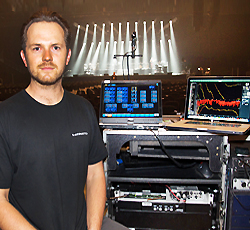
A couple of trusted friends, both long-time touring sound veterans, recently introduced me to Tom Worley as a highly skilled system pro who not only really knows his stuff, but is a true pleasure to work with. Not yet 30 years of age, Tom’s worked with a who’s who of tours by top artists, largely as a system engineer/tech, and most recently, as the audio crew chief for leading UK touring company Britannia Row on the recent Depeche Mode world tour. I thought it beneficial to present more about Tom’s career path and “how he got here.”
Keith Clark: Were you always interested in audio? How did you get your start on the professional side?
Tom Worley: Not at all, I grew up on a deer farm on the east coast of New Zealand. I did, however, play music, but mostly was interested in sports. Along the way I was offered an opportunity to intern at Oceania Audio out of Auckland in New Zealand, starting out with sanding and painting (Turbosound) Flashlight cabinets but moving pretty quickly into the technical side.
KC: Was the evolution to working on the system engineering/tech side of the equation, as opposed to the mix side, intentional?
TW: It wasn’t, but more a result of starting my career in New Zealand, where it was important to have a broad spectrum of skills. I’ve always been on the rental company side as well. It’s served me well for nearly 12 years.
KC: Ever have the desire to get behind the console? Or, if/when you do, what do you like/dislike about it?
TW: I love all aspects of sound. The mixing console is obviously a very important link in the chain, and I do get a sense of satisfaction from mixing. Especially monitors—I find it a lot more satisfying and enjoy developing a close relationship with the bands and crew.
KC: What part of systems engineering most interests you?
TW: I’ve always enjoyed working with people, and also am passionate about the logistics and management of it. I like being in challenging situations, overcoming difficult scenarios and hearing mix engineers get great results. As we all know, sound is very subjective, and there’s certainly no right way to achieve what we want. It’s great when you have the time to experiment, listen, and learn.
KC: What are the most challenging aspects of the job?
TW: Nowadays it’s the public’s perception of what a concert should sound like. Yes, the technology, tools, and education are better than ever before, but the audience has very high expectations, not only for sound but all facets of the production, because the precedent has come to be set so high.
KC: And what are the most exciting and/or satisfying aspects?
TW: For me, it’s the music. Fundamentally, music is what’s gotten me here in the first place. It’s very satisfying to experience a great band playing great music in some amazing parts of the world.
KC: How do you stay on top of the latest techniques and technologies?
TW: I’ve been fortunate to have affiliations with some of the best rental companies in the world. Not only have they offered me formal training, but their personnel have mentored me, providing a great amount of advice and direction along the way. I’m now working to do the same with up-and-coming system engineers. In this way, we all thrive.
KC: What’s the most challenging gig you’ve worked, and why?
TW: The recent Depeche Mode Delta Machine world tour kept me on my toes a lot. Every night felt like the first. The gear was working hard and traveled a lot, but we had a great team of PA techs who were real professionals. Britannia Row’s commitment to service is remarkable. This tour is definitely a highlight in my career to this point.
KC: Is there a “best way” to build a career as a system engineer?
TW: From the ground up. In any profession, having a better understanding of the whole enhances knowledge, so truly understanding every facet of house and monitor systems, combined with experience, leads to an unsurpassable skill-set. My advice to those just starting out in pro audio is to get in with the rental companies and work incredibly hard, and it will eventually pay off.
KC: What are the keys to working successfully with mix engineers?
TW: First you must be personable and approachable. Then work out as quickly as possible what they’re trying to achieve, combining their ideas with your knowledge to get the most out of the systems at every show, no matter what. Work together, make compromises if necessary, and always have the best interests of the artist at heart.
Keith Clark is editor in chief of ProSoundWeb and Live Sound International.
